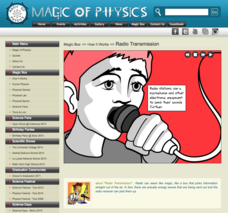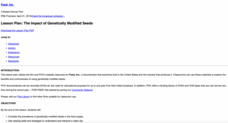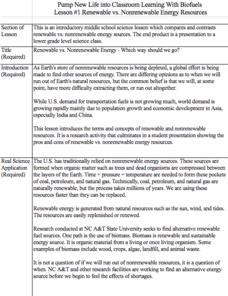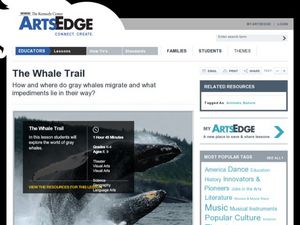Curated OER
In Case of Emergency
A natural disaster could strike at any time: do your learners know the school and community emergency plans? Start the school year by honing research and speaking skills in a practical way with this preparedness instructional activity....
Curated OER
Create a Weather Newscast
Fourth graders explore and study basic weather terms, strengthen research skill on the web and create a weather newscast. They choose a weather site on the web, copy weather maps and create a videotape based on a written script to...
PBS
Blow the Roof Off!
Blow the minds of young scientists with this collection of inquiry-based investigations. Based on a series of eight videos, these "hands-on, minds-on" science lessons engage young learners in exploring a wide range of topics...
Curated OER
Weather Report
Students prepare a weather script for a broadcast. In this weather broadcasting lesson, student record the present temperature, high temperature, a sky watch, and the current moon phase to be presented in a school broadcast at the...
Magic of Physics
Radio Transmission
Radio waves are all around us! How do they transmit sound? Using an interactive, scholars examine how songs travel through the air. The resource explains the process from the radio station, to signal towers, to the radio unit. A look at...
Curated OER
Create a Weather Newscast
Fourth graders explore, research and study how to make and give a weather newscast. They assess a variety of weather terms, research skills on the Web and develop an oral presentation on a weather newscast to present to their classmates.
PBS
The Impact of Genetically Modified Seeds
What is all the fuss about genetically modified foods? PBS provides this resource designed to supplement the documentary Food, Inc. to help learners investigate the benefits and controversies of genetically modified foods...
ReadWriteThink
Webcams in the Classroom: Animal Inquiry and Observation
Boost observational skills with an inquiry-based lesson that takes scholars on a virtual field trip. With help from webcams, learners observe animals in a zoo or aquarium. Observations go into a journal and a discussion is held to review...
Kenan Fellows
Renewable vs. Nonrenewable Energy Resources
Is one type of energy inherently good or bad? Young scientists explore energy resources in a week-long unit. After extensive research, groups create powerful position statements and presentations supporting their energy resource of choice.
NASA
The Case of the Wacky Water Cycle
Join the tree house detectives in learning about the processes of the water cycle, water conservation, water treatment, and water as a limited resource.
Curated OER
Webquest: Eradicating Guinea Worm Disease in Ghana
Learners examine the impact of Guinea Worm Disease. In this world issues lesson, students take on the roles of Peace Corps Volunteers. Learners will apply their knowledge of the Guinea worm life cycle to create a plan for eradicating the...
Curated OER
Waves: Sound and Light
A few definitions related to waves open this slide show. Note that the information only covers light waves even though the title mentions sound. Correct the title before using this resource. Another mention is a set of photos of a class...
Institute of Electrical and Electronics Engineers
Radio Reception and Transmission
After reading about radio transmission, application, and the difference between AM and FM, small teams of engineers use a kit to construct an FM radio and then send and receive broadcasts. This is an ideal activity for middle school STEM...
Curated OER
Fracking: Positive or Negative Impact?
Your teenagers may have heard of fracking, but do they really know what it is? And could they debate the benefits and risks? Educate your environmental science class with a lesson about hydraulic fracturing, non-renewable energy...
Columbus City Schools
Geological Effects of Plate Tectonics
Don't get your classes all shook up about plate movement, instead use a thorough unit that guides learners to an understanding of plate tectonics. The lessons incorporate a study of the types of plate boundaries and their effects on the...
Curated OER
The Whale Trail
Students research the Gray Whale. In this Gray Whale lesson, students use KWL charts to organize information. Students do Internet research to gain information about the whales. Students get into groups and create a mock news...
Curated OER
Cloud in the Classroom
Students describe the relationship between animals and humans. In this biology lesson, students research about the history of horses in America. They present a mock news broadcast about their research.
Curated OER
The Loneliest Animals
Students examine the different species that are headed towards extinction. In this animal population lesson plan students compare the causes of extinction, research an endangered species and present an oral report.
Curated OER
Poetry In the World Around Us
Students engage in a lesson which is designed as a literacy connection to science lessons on the effects of water on plants. This lesson uses an excellent Reading Rainbow episode on the effect of drought, and then rainfall, have on the...
Curated OER
Who Has the Data? Monitoring Coral Reefs
Students access data to characterize coral reefs. In this scientific research lesson, students access data and explain the need for such data when monitoring coral reefs. They will identify and explain three major threats to coral reefs.
Curated OER
Estuary Interviews
Students role play as newscasters to highlight the lives of estuary animals. In this estuary animal lesson, students watch local new shows to examine how interviews take place. They research the lives of animals that live in estuaries...
DiscoverE
Hoop Glider
Fly into an engineering lesson sure to get your scholars' interest off the ground. Young pupils create hoop gliders out of straws and paper hoops. Adjusting the size and number of the hoops lets them investigate the effect on flight...
Curated OER
Comparing the Satellite and Broadcast Radio Landscapes
Students research the development of satellite technology over the last 50 years students explain how the enactment of the Telecommunications Act of 1996 changed the rules for corporate ownership of multiple media outlets.























